|
| NEWS |
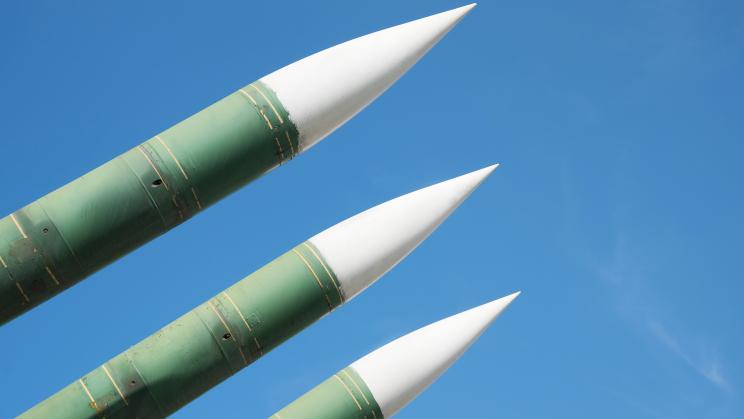 |
| Statement by SIPRI Director: Suspending the New START treaty benefits nobody |
|
On 22 February, Dan Smith, SIPRI Director, commented on the decision taken by Russian President Vladimir Putin to suspend Russia’s participation in the New START treaty. The treaty is the last remaining nuclear arms control agreement between Russia and the United States. The treaty obligates both parties to reduce their number of deployed nuclear weapons. Although Russia has not withdrawn from the treaty, its actions have created uncertainty and could be dangerous given the current atmosphere of hostility.
|
|
|
Read the statement
|
|
|
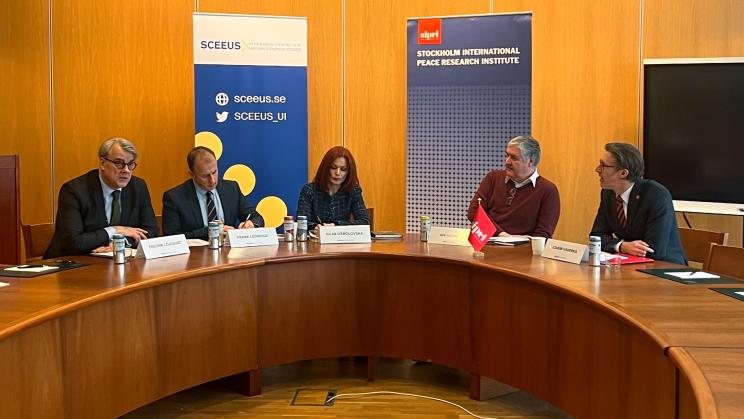 |
| SIPRI and SCEEUS host event on security governance after Russia’s war against Ukraine |
|
On 22 February, SIPRI and the Stockholm Centre for Eastern European Studies (SCEEUS) hosted a roundtable discussion on ‘Security Governance after Russia’s War against Ukraine’. The event was hosted by the Swedish Institute of International Affairs and focused on different scenarios for Ukraine’s future security as part of Europe and the West. Welcome remarks were provided by Fredrik Löjdquist, SCEEUS Director, and Joakim Vaverka, SIPRI Deputy Director. Opening remarks were provided by Iuliia Osmolovska, Head of GLOBSEC’s Kyiv Office, and Frank Ledwidge, GLOBSEC Associate. Dr Ian Anthony, Director of the SIPRI European Security Programme, chaired the discussion.
|
|
|
Read more
|
|
|
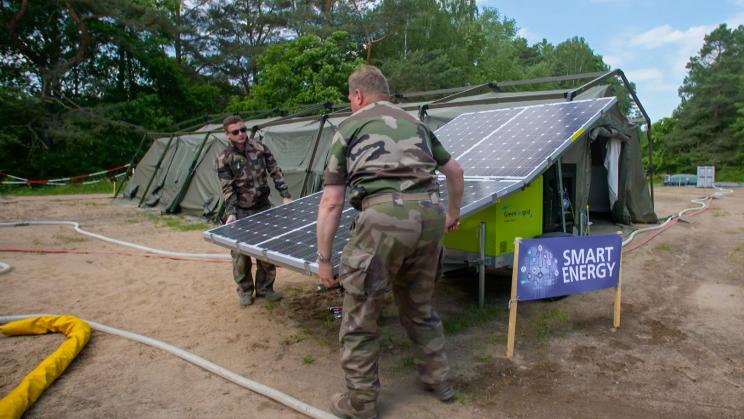 |
| New video series on climate security, Sweden and NATO |
|
SIPRI is pleased to launch a new video series that explores how the North Atlantic Treaty Organization (NATO) can help address the security implications of climate change. The series features experts from the Brookings Institution, Global Affairs Canada, NATO and the Swedish Armed Forces. The interviews were conducted during a workshop held in Stockholm in December 2022 entitled ‘Climate Security, Sweden and NATO’.
|
|
|
Read more | Watch the playlist
|
|
|
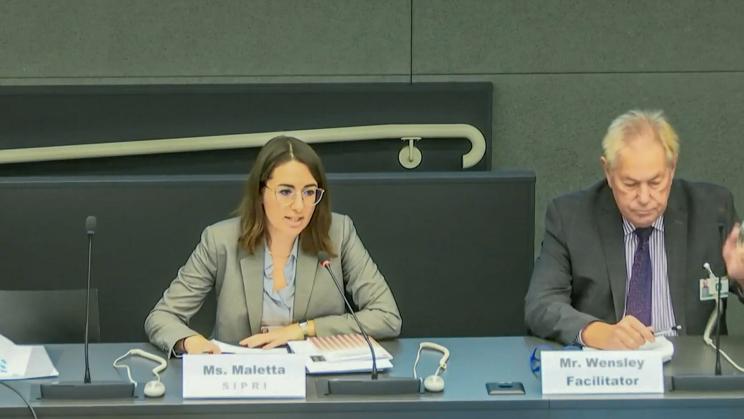 |
| SIPRI briefs the Arms Trade Treaty Working Group |
|
On 15 February, Giovanna Maletta, Acting Director of the SIPRI Dual-Use and Arms Trade Control Programme, participated in a meeting of the Arms Trade Treaty’s Working Group on Effective Treaty Implementation. Maletta presented the findings of the SIPRI Policy Paper ‘Post-shipment On-site Inspections: Multilateral Steps for Debating and Enabling Their Adoption and Use’, published in October 2022. SIPRI was invited to present the Policy Paper to inform a discussion on post-delivery cooperation conducted in the context of the sub-working group on Article 11, which focuses on issues related to the risk of diversion of weapons.
|
|
|
Read more | Read the SIPRI Policy Paper
|
|
|
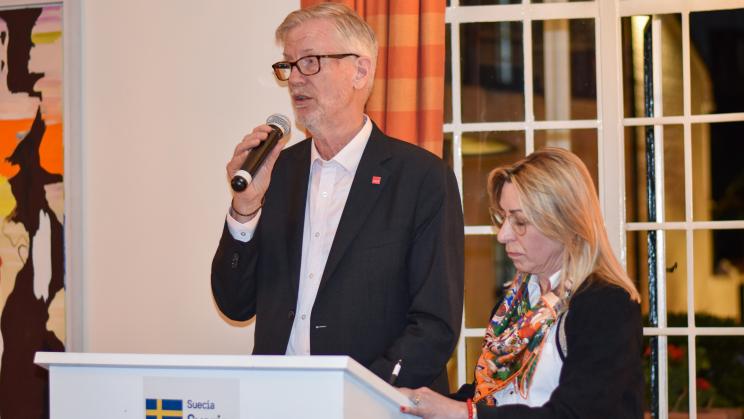 |
| SIPRI presents Environment of Peace report in Colombia and Brazil |
|
SIPRI held a launch of its Environment of Peace report in Latin America. The report was presented at an event organized in collaboration with the Embassy of Sweden in Bogotá, Colombia. Helena Storm, Swedish Ambassador to Colombia, provided introductory remarks followed by remarks from Danilo Rueda, Colombia’s High Commissioner for Peace, and Dan Smith, SIPRI Director. The event brought together 90 representatives from the government, the United Nations, Swedish and local non-governmental organizations, and the academic and diplomatic communities.
|
|
|
Read more | Read the report
|
|
|
 |
| SIPRI at the 2023 Munich Security Conference |
|
SIPRI co-hosted several events during the 2023 Munich Security Conference. These included a session on the food–climate–security nexus with the BMW Foundation and the World Food Programme; a session on the impact of the war in Ukraine on conflict risk with the International Crisis Group; and a session on updating European Union (EU) crisis management with the Center for International Peace Operations. SIPRI also held bilateral discussions and spoke with various media outlets during the conference.
|
|
|
Read more
|
|
|
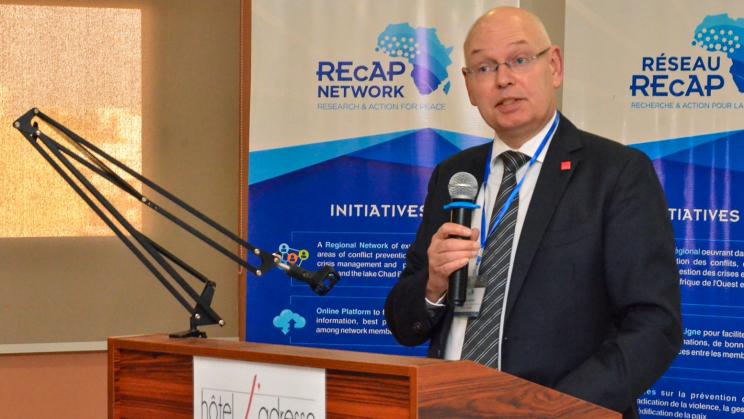 |
| SIPRI and partners launch the Research & Action for Peace Network in Senegal |
|
On 2 February, SIPRI and its partners launched the Research & Action for Peace (REcAP) Network. The REcAP Network is a collaboration between SIPRI, the West Africa Network for Peacebuilding, the Danish Refugee Council and the Delegation of the EU to Senegal. The REcAP Network seeks to strengthen the role of civil society in effective peacebuilding. It aims to establish an interactive platform for regional cooperation in order to prevent conflicts and violent extremism in West Africa and the Lake Chad region.
|
|
|
Read more
|
|
|
 |
| Peace Points: Ukraine—One year on |
|
One year after the Russian invasion of Ukraine, Dan Smith, SIPRI Director, reflects on the current state of affairs and the wider implications of the war. Smith argues that the conflict may develop into a protracted war with high human costs as there is currently no clear pathway towards peace. The wider implications of the conflict include food insecurity and rising costs of living for many countries around the world.
|
|
|
Watch the Peace Points episode | Access the Peace Points video playlist
|
|
|
 |
| Spotlight: Line Gordon—Stockholm Resilience Centre |
|
As part of the Stockholm Hub on Environment, Climate and Security, SIPRI interviewed Line Gordon, Director of the Stockholm Resilience Centre. In this episode, Gordon speaks about the positive outcomes of the annual UN Climate Change Conference (COP27) and the remaining challenges for the climate agenda. Additionally, she shares insights on what can be done to move the climate agenda forward and address the food systems challenges.
|
|
|
Watch the video | Access the Spotlight video playlist | Read more about the Stockholm Hub on Environment, Climate and Security
|
|
|
|
| COMMENTARY |
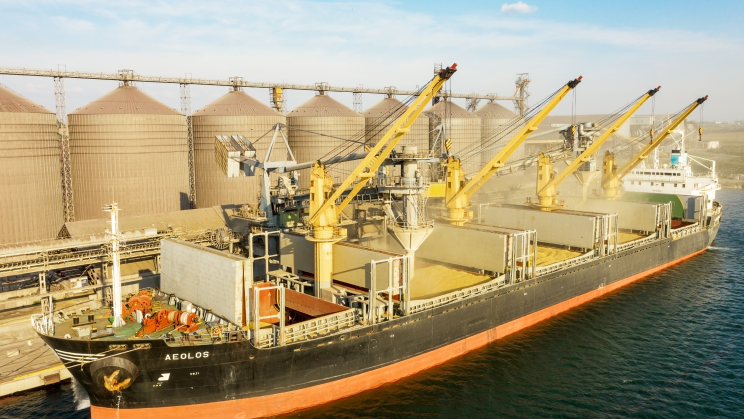 |
| War in the breadbasket: One year in |
|
This SIPRI WritePeace Blog summarizes the wider implications of the invasion of Ukraine. The war has disrupted global food security, humanitarian aid and political stability. Hundreds of millions of people worldwide are now severely food insecure due to the conflict. The war has caused major disruptions in global supply chains and the trade of food and fertilizers as well as a host of other problems. In response, the blog argues that food security should be approached as an issue of global stability, security and peace as well as a question of social and economic development and human well-being.
|
|
Read the SIPRI WritePeace Blog
|
|
|
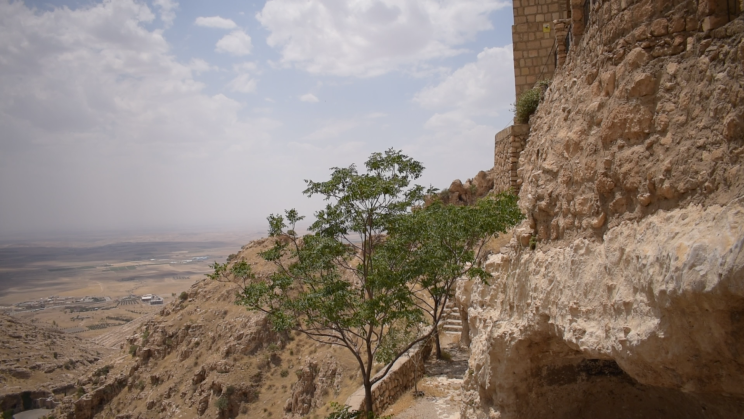 |
| Climate change and post-conflict reconstruction in the Nineveh Plains of Iraq |
|
This SIPRI WritePeace Blog urges holistic reconstruction in northern Iraq, considering the impact of the Islamic State and climate risks. The region currently faces extreme weather events, droughts and reduced rainfall. The blog argues that reconstruction must overhaul and modernize water infrastructure and improve the overall management of resources. Addressing climate-related challenges should be an integral part of post-conflict reconstruction processes to ensure success.
|
|
Read the SIPRI WritePeace Blog
|
|
|
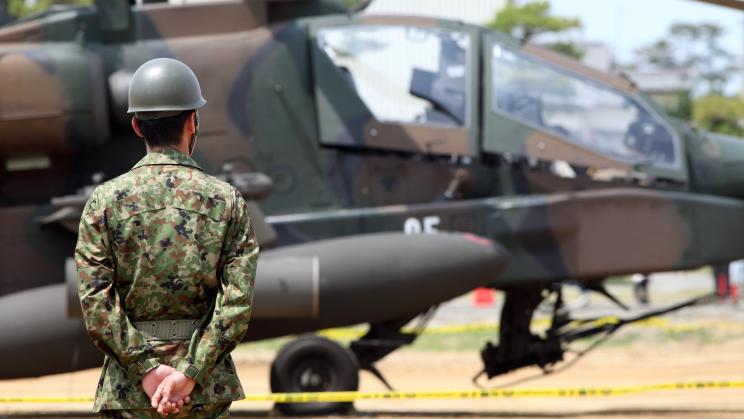 |
| Japan’s new military policies: Origins and implications |
|
The Japanese government recently approved three policy documents that will allow a significant expansion of Japan’s military capabilities and a major increase in military spending over five years. The new documents will modify Japan’s exclusively defence-oriented policy, allowing it to participate more actively in collective self-defence with the USA and to increase its ability to project force beyond its borders. This SIPRI WritePeace Blog takes stock of these monumental changes and the security context that has driven them.
|
|
Read the SIPRI WritePeace Blog
|
|
|
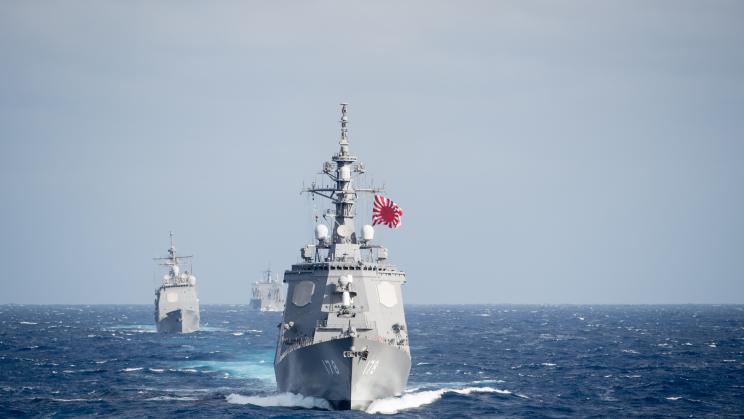 |
| The proposed hike in Japan’s military expenditure |
|
Japan’s government announced a 26 per cent increase in the 2023 budget for the Japanese Self-Defense Forces to JPY 6.8tn ($52 billion), the highest year-on-year nominal increase in military spending since 1952. This SIPRI Topical Backgrounder uses information from the SIPRI Military Expenditure Database to analyse these developments. The new budget is the first under Japan’s new National Security Strategy and a dramatic shift from post-war military policy, which limited military capabilities and spending to 1 per cent of GDP. The increase comes as Japan cites a worsening security environment around it, including China’s growing assertiveness, North Korea’s unpredictable military activities and Russia’s invasion of Ukraine.
|
|
Read the SIPRI Topical Backgrounder
|
|
|
|
| RECENT EVENTS |
| |
| 15–16 February 2023 |
| SIPRI joins the first summit on Responsible AI in the Military Domain in The Hague |
|
SIPRI actively participated in two sessions at the first summit on Responsible AI in the Military Domain (REAIM 2023) held on 15–16 February in The Hague, the Netherlands. Dr Vincent Boulanin, SIPRI Senior Researcher, chaired the session on ‘Responsible Adoption of AI in the Nuclear Domain’. The session aimed to generate a conversation on measures to ensure that the progress of AI will limit, rather than increase, nuclear risk. SIPRI hosted the session on ‘Autonomous Weapon Systems and Compliance with International Humanitarian Law (IHL)’, which aimed to explore to what extent IHL-mandated evaluations can be fully or partially delegated. REAIM 2023 brought together stakeholders from governments, industry, civil society, academia and think tanks to discuss the opportunities, dilemmas and vulnerabilities associated with military AI.
|
|
Read more
|
| |
| 26 January 2023 |
| SIPRI joins high-level meeting of the Stockholm Hub on Environment, Climate and Security |
|
SIPRI continues to be involved in the Stockholm Hub on Environment, Climate and Security, a cross-institutional research collaboration supported by the Swedish Ministry for Foreign Affairs. The Stockholm Hub’s January meeting focused on the current food crisis and the systemic weakness of global food systems. It included knowledge briefings from researchers at the Stockholm Resilience Centre and SIPRI, and a discussion among representatives from Swedish ministries and agencies and the Swedish parliament. The Stockholm Hub combines the strengths of four leading Stockholm-based research institutes to provide evidence-based insights into how transformative solutions can build security and prosperity and strengthen societies’ resilience in the face of a changing climate and environmental degradation.
|
|
Read more
|
|
| PUBLICATIONS |
 |
| Climate, Peace and Security Fact Sheet: Afghanistan |
|
This fact sheet explores the nexus between climate change, peace and security in Afghanistan. Afghanistan is highly vulnerable to the effects of climate change with more frequent extreme weather events and temperatures that are increasing faster than the global average. These factors, coupled with the legacy of four decades of war, a complex humanitarian emergency, and an economic crisis since the Taliban’s takeover of the government in August 2021, have heightened the vulnerability of the Afghan population. The fact sheet is a collaboration between the Norwegian Institute of International Affairs and SIPRI.
|
|
Read the fact sheet
|
|
|
 |
| Climate, Peace and Security in a Changing Geopolitical Context: Next Steps for the European Union |
|
This SIPRI Policy Brief discusses the need to address the connection between climate change, peace and security in the EU’s foreign, security and defence policies. The paper suggests that Sweden, known for its work on climate security, can use its presidency of the Council of the EU in 2023 to improve coordination between the European External Action Service and the European Commission’s climate adaptation and mitigation efforts. It argues that by collaborating more closely, the EU can take preventative action against climate-related security risks in the short to medium term.
|
|
Read the SIPRI Policy Brief
|
|
|
 |
| The Involvement of Civil Society Organizations in Arctic Governance |
|
This SIPRI Insights Paper examines the role of civil society organizations (CSOs) in the governance of the Arctic region, which is facing both environmental and geopolitical challenges. The report uses a literature review and a survey to analyse CSO involvement in Arctic governance, finding that they monitor agreements, advocate for regional accountability, support policy implementation, engage in advocacy work and provide input during geopolitical crises. However, the paper also found that CSOs have weak levels of belief in the legitimacy and appropriateness of Arctic governance institutions. Based on these findings, the paper recommends ways to further involve CSOs in Arctic governance.
|
|
Read the SIPRI Insights on Peace and Security
|
|
|
 |
| Using Taxation to Fund Military Spending |
|
This SIPRI Insights Paper presents a statistical analysis of data from 100 countries between 1990 and 2020, as well as case studies of Burundi and Ukraine, to explore the use of taxation to fund military spending. It notes that the use of taxation to fund military spending, in particular, can have implications for economic growth and income inequality. The paper finds that countries in conflict, especially low-income countries and those with autocratic regimes, tend to rely on indirect taxation to fund military spending.
|
|
Read the SIPRI Insights on Peace and Security
|
|
|
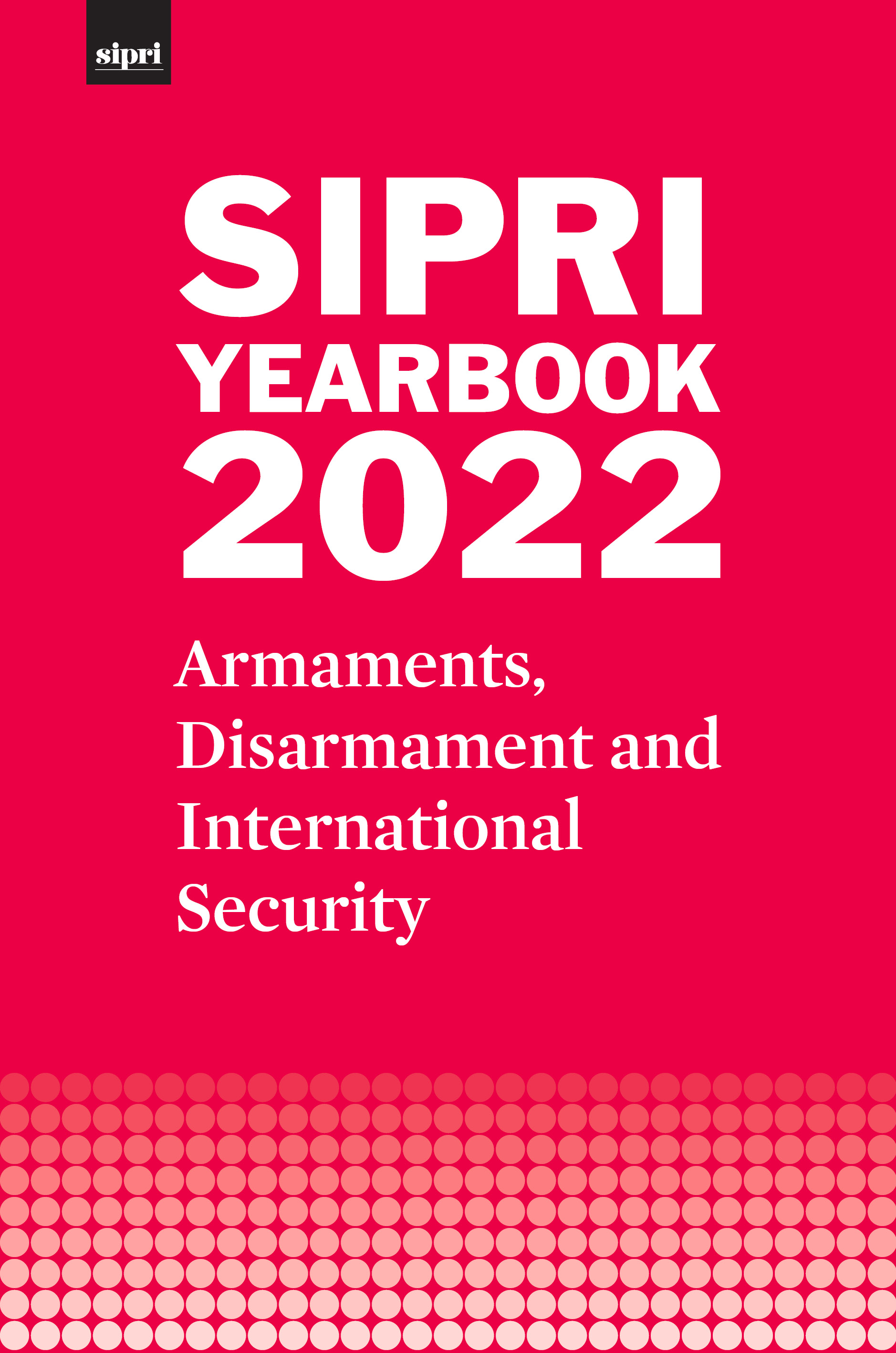 |
| SIPRI Yearbook 2022 |
SIPRI Yearbook 2022 presents a combination of original data in areas such as world military expenditure, international arms transfers, arms production, nuclear forces, armed conflicts and multilateral peace operations with state-of-the-art analysis of important aspects of arms control, peace and international security. In addition to its detailed coverage of nuclear arms control and non-proliferation issues, the latest edition of the SIPRI Yearbook includes
- insight on developments in conventional arms control in 2021;
- regional overviews of armed conflicts and conflict management;
- in-depth data and discussion on military expenditure, international arms transfers and arms production; and
- comprehensive coverage of efforts to counter chemical and biological security threats.
|
|
Browse the contents page | Download the summary (PDF) | Download the sample chapter on world nuclear forces (PDF) | Order SIPRI Yearbook 2022
|
|
|
| |
|
|
|